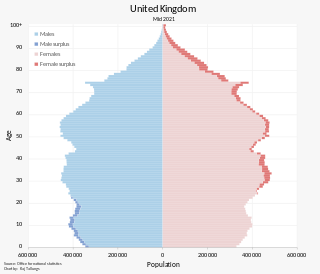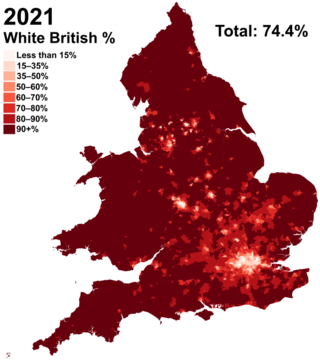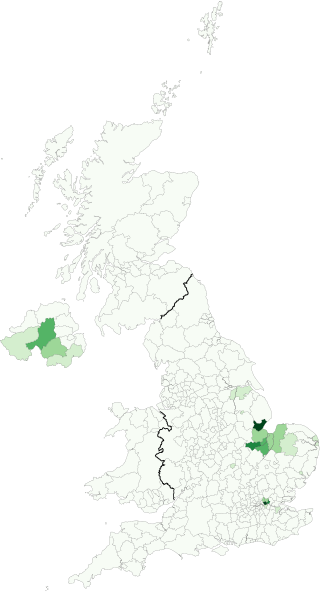| Total population | |
|---|---|
| 15,935 Lebanese-born (2011 Census) | |
| Regions with significant populations | |
| London, South East England, Birmingham, Liverpool, Manchester | |
| Languages | |
| English, Arabic and French | |
| Religion | |
| Maronite, Greek Orthodox, Shiite, Druze, Sunni, Protestant |
Lebanese people in the United Kingdom include people originating from Lebanon who have migrated to the United Kingdom and their descendants.
Although there has been sporadic migration from the Middle East to Britain since the 17th century, the real growth of the UK Lebanese population began in 1975, with the start of the civil war in Lebanon which drove thousands of people away. The exodus was aggravated in 1982 with the Israeli invasion. [1]
The 2001 UK Census recorded 10,459 Lebanese-born people. [2] The 2011 census recorded 15,341 people born in Lebanon residing in England, 228 in Wales, [3] 314 in Scotland [4] and 52 in Northern Ireland. [5]
Edgware Road in London is one of a number of areas that the Lebanese community has settled in and has shops selling Arabic newspapers, books and music. Other areas with Lebanese communities in London include Bayswater, Kensington and Westbourne Grove. [1]

The population of the United Kingdom was estimated at over 67.0 million in 2020. It is the 21st most populated country in the world and has a population density of 270 people per square kilometre, with England having significantly greater density than Wales, Scotland, and Northern Ireland. Almost a third of the population lives in south east England, which is predominantly urban and suburban, with about 9 million in the capital city, London, whose population density is just over 5,200 per square kilometre.

The demography of England has since 1801 been measured by the decennial national census, and is marked by centuries of population growth and urbanization. Due to the lack of authoritative contemporary sources, estimates of the population of England for dates prior to the first census in 1801 vary considerably. The population of England at the 2021 census was 56,489,800.

White British is an ethnicity classification used for the native white population identifying as English, Scottish, Welsh, Cornish, Northern Irish, or British in the United Kingdom Census. In the 2011 census, the White British population was 49,997,686, 81.5% of Great Britain's total population. For the United Kingdom entirely, due to different reporting measures within Northern Ireland which includes all those who identified as British with those who identified as Irish, an amalgamated total of 52,320,080 including those who identified as White Irish in Great Britain is given making up 82.8% of the population.
Australians in the United Kingdom, or Australian Britons, include Australians who have become residents or citizens of the United Kingdom. The largest segment of Australia's diaspora of 1 million resides in the United Kingdom.
British Iraqis are British citizens who originate from Iraq.

British Arabs are British citizens of Arab descent. They share a common Arab ethnicity, culture, language and identity from different Arab countries. Arabs also come from non-Arab countries as ethnic minorities.
Kenyan migration to the United Kingdom has been occurring for many decades. As a result, many people in the UK were born in Kenya, or have Kenyan ancestry. Many Kenyan people who migrated to the UK are of South Asian extraction.
Malaysians in the United Kingdom are British citizens who have full or partial Malaysian origin or descent and Malaysian citizens residing in the United Kingdom. The 2001 UK Census recorded 49,886 Malaysian-born people. The 2011 census recorded 62,396 people born in Malaysia living in England, 2,117 in Wales, 4,721 in Scotland and 705 in Northern Ireland. The largest concentrations of Malaysian-born residents were recorded in Greater London and South East England (11,331). The Office for National Statistics estimates that 75,000 Malaysian-born expatriate were resident in the UK in 2017.

Romanians in the United Kingdom refers to Romanian immigrants in the United Kingdom, both citizens and non-citizens, along with British citizens of Romanian ancestry. The number of Romanian-born people resident in the UK has risen from 83,168 at the time of the 2011 United Kingdom census to an estimated 539,000 in England and Wales alone in 2021.
Peruvians in the United Kingdom or Peruvian Britons are Peruvian immigrants to the United Kingdom, who form part of the larger Latin American community in the UK. In 2001, the stock of Peruvian-born immigrants was the sixth largest amongst all Latin American immigrants to the UK.
British Moroccans are citizens and/or residents of the United Kingdom whose ethnic origins lie fully or partially in Morocco.
Czechs in the United Kingdom refers to the phenomenon of Czech people migrating to the United Kingdom from the Czech Republic or from the political entities that preceded it, such as Czechoslovakia. There are some people in the UK who were either born in the Czech lands or have Czech ancestry, some of whom descended from Jewish refugees who arrived during World War II.
Yemenis in the United Kingdom or Yemeni Britons include citizens and non-citizen immigrants in the United Kingdom of Yemeni ancestry, as well as their descendants. Yemenis have been present in the UK since at least the 1860s, with the first Yemenis arriving as sailors and dock workers in the port cities of Northern England and Wales, and despite a smaller population than other British Muslim groups, are likely the longest-established Muslim group in the United Kingdom, with many of these cities retaining a Yemeni population going back several generations.
Egyptians in the United Kingdom or Egyptian Britons are Egyptian citizens or people of Egyptian ancestry who are citizens or residents of the United Kingdom.

New Zealanders in the United Kingdom are citizens or residents of the United Kingdom who originate from New Zealand.

Since 1922, the United Kingdom has been made up of four countries: England, Scotland, Wales and Northern Ireland. The UK Prime Minister's website has used the phrase "countries within a country" to describe the United Kingdom. Some statistical summaries, such as those for the twelve NUTS 1 regions of the UK, refer to Northern Ireland, Scotland, and Wales as "regions". With regard to Northern Ireland, Scotland and Wales particularly, the descriptive name one uses "can be controversial, with the choice often revealing one's political preferences".

According to ONS estimates in 2019 there were 76,000 Nepalese-born people in the United Kingdom.
Algerians in the United Kingdom are residents of the UK with ancestry from Algeria. They include Algerian-born immigrants and their British-born descendants.
Congolese in the United Kingdom consist of immigrants from the Democratic Republic of the Congo (DRC) living in the United Kingdom as well as their British-born descendants. The demonym Congolese can also refer to people from the Republic of Congo, of whom there are fewer living in the UK.

Lithuanians in the United Kingdom include individuals born in Lithuania who have migrated to the UK, among them Lithuanian citizens of Russian descent and Polish Lithuanian citizens, as well as their British-born descendants. The 2011 UK Census recorded 95,730 Lithuanian-born residents in England, 1,353 in Wales, 4,287 in Scotland, and 7,341 in Northern Ireland. The previous, 2001 UK Census, had recorded 4,363 Lithuanian-born residents. The Office for National Statistics estimates that 144,000 Lithuanian-born immigrants were resident in the UK in 2013.